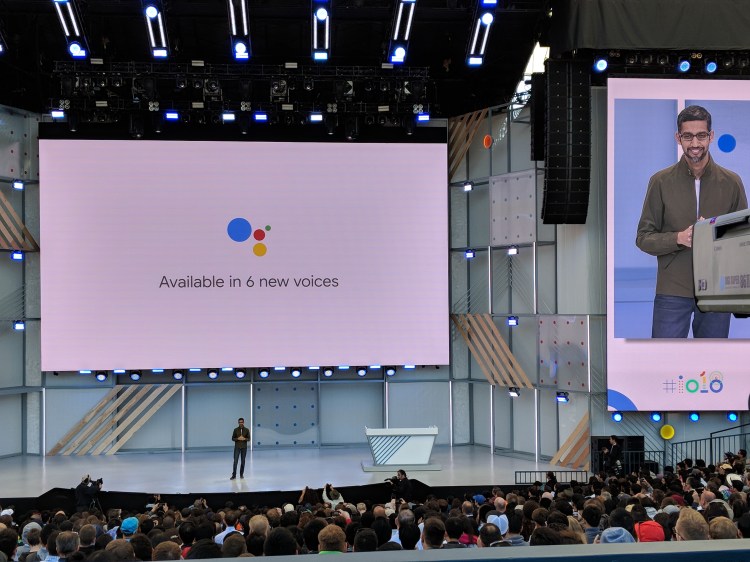testsetset
Google Assistant is getting six new voices, will provide new visual experiences, will encourage children to say please, and will soon even make phone calls for you. A series of new features were announced today at I/O, Google’s annual developer conference being held in Mountain View, California on May 8-10.
Google Assistant’s six new voices are available starting today. Using its WaveNet AI, singer John Legend’s voice will be available for things like My Day updates from Google Assistant later this year, CEO Sundar Pichai said.
In an onstage demo, Google Assistant made a phone call to schedule a haircut at a local salon. An experimental version of the tech that Pichai said has been years in the making will be available in the coming weeks.
June 5th: The AI Audit in NYC
Join us next week in NYC to engage with top executive leaders, delving into strategies for auditing AI models to ensure fairness, optimal performance, and ethical compliance across diverse organizations. Secure your attendance for this exclusive invite-only event.
Other new enhancements — including multiple actions, the ability to deliver multiple commands in a single sentence, and the ability to speak with Google Assistant without the need to say “OK Google” every time you want to give a command — will be available in the coming weeks.
Pretty Please is another new feature announced today. Powered by FamilyLink, Pretty Please will encourage kids to say please when speaking with Google Assistant; it will be available later this year.
This new feature is announced the same day as the beginning of sales of Amazon’s Echo Dot for Kids, which likewise encourages kids to be polite to their servile digital assistant.
Changes are also on the way for visual experiences with Google Assistant. Users will be able to control smart home devices through the Assistant’s visual display, and actions — Google Assistant’s voice apps — will also have a more visual experience in the future.
- Swipe up with Google Assistant on an Android phone today and you will see your history of interactions. Starting this summer, this will become a dashboard of information based on your schedule or will deliver suggestions based on the time of day or your location.
- The first touchscreen devices from manufacturers like Sony, Lenovo, and LG, announced at CES in January, will be available in July.
- Google Assistant is now available on more than 500 million devices around the world.
In its ambition to keep up with or stay ahead of competitors like Alexa, Siri, and Cortana, Google Assistant has adopted a series of new features in recent months, including location-based reminders (“OK Google, remind me when I get to work to print out the report”) and voice peer-to-peer payments with Google Pay (“Hey Google, send Charlotte $15 for lunch today”).
Routines, commands that accomplish multiple tasks with a single phrase, were first made available this spring. With Routines you can say “OK Google, good morning” to, say, turn your phone off silent mode, turn on your lights, lift your window shades, hear about events on your calendar, and get a rundown of the day’s news and weather reports.
Custom Routines are available in the Google Home app starting today.
Lens, Google Assistant’s computer vision service now available on Android smartphones, has also grown more robust. First introduced at I/O one year ago, Lens is now able to scan business cards, recognize plants and animals (to varying degrees of accuracy), and recognize landmarks and famous people.
The ability to purchase movie tickets with your voice was first introduced on Friday with the launch of the Fandango Google Assistant voice app.
Many efforts have also been rolled out to support developers making voice apps for Google Assistant.
At Mobile World Congress earlier this year, for the first time Google began to bring together experiences between its Android app ecosystem and its Actions on Google voice app ecosystem. The Actions on Google platform first launched in December 2016.
To spread its voice experience around the world, around the same time, VP Nick Fox said Google is committed to bringing Google Assistant to more than 30 languages by the end of 2018, a feat that would put it ahead of competitors like Alexa that only speak English, German, and Japanese today — and one that would put Google’s AI assistant in the hands of 95 percent of Android smartphone users.
To support a fledgling voice developer ecosystem, last week Google announced the opening of an investment fund to support voice AI startups like Pulse Labs and Edwin.
Daily updates and push notifications for Actions on Google developers were introduced in March.


